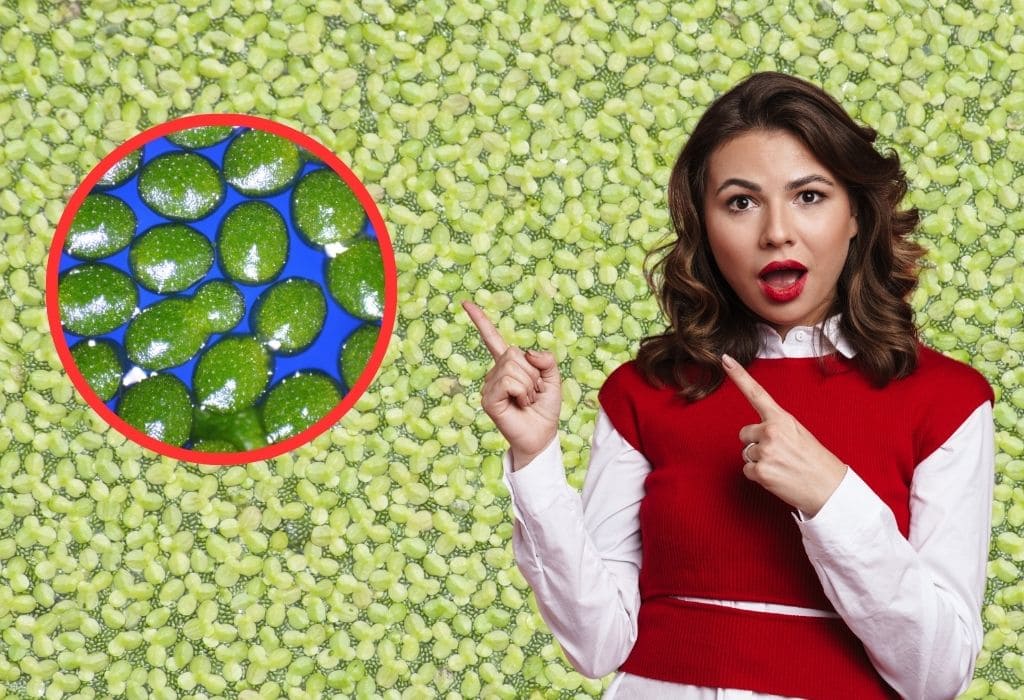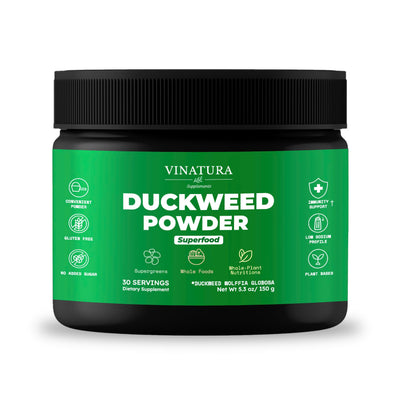
Is Duckweed Edible? What Does Duckweed Taste Like?
Duckweed, a widely found and diverse plant species in tropical and subtropical regions, thrives as a water plant in ponds, fields, and lakes. Its rapid growth rate has made it popular among many locals. But Is Duckweed edible and what about its edibility and taste? This blog post aims to provide an answer to that intriguing question.
Before exploring further, please read the disclaimer located at the end of this webpage.
Is Duckweed Edible?
Duckweed, a small and free-floating aquatic plant, is a member of the Lemnaceae family. It is frequently found in stagnant or slow-moving bodies of water, including ponds, lakes, and marshes.
One of the notable characteristics of duckweed is its remarkable growth rate and capacity for rapid reproduction. This enables it to form dense mats or colonies on the water's surface, creating a visually captivating sight.
A scientific study has revealed that duckweed holds great promise as a protein source for human food products. Its exceptional protein content and environmentally friendly production characteristics make it an attractive option. [1]
Furthermore, a comprehensive online survey involving 669 participants confirmed that consumers hold a more favorable opinion of duckweed and are more inclined to embrace meals incorporating duckweed when it is used in appropriate dishes. [1]
Based on the survey, participants most frequently mentioned 'salad' as the dish incorporating duckweed, followed by 'sandwich' and 'garnish'. [1]
Nutrition Of Duckweed For Human Consumption
The nutritional composition of duckweed is greatly influenced by the species and cultivation conditions [2]. Below, you will find a list of the various dietary ingredients that can be found in duckweed for human consumption:
Protein Content and Amino Acid Composition
Certain duckweed species are rich in protein, boasting levels as high as 45%. These protein sources provide all the essential amino acids recommended by the Food and Agriculture Organization of the United Nations (FAO), supporting the growth and development of the human body [2].

Fat Content
According to a study, Wolffia species have been found to contain a fat content ranging from 1% to 5% [3]. Wolffia is one of the aquatic plant genus of the duckweed group. The duckweed group includes the genera Lemna, Spirodela, Wolffiella, and Wolffia. Wolffia is the minorest genus in this group, with compact and rootless aquatic plants.
Minerals
Duckweed is a rich source of minerals, including calcium, iron, manganese, magnesium, potassium, and zinc. However, these minerals' specific amount and ratio may vary based on the plant's origin and growing conditions.
The mineral composition of all Wolffia samples studied can be described as relatively rich in potassium and iron and poor in sodium, making duckweed useful for healthy human nutrition. [3]

Phytosterols
Phytosterols, a compound in plant foods like duckweed, offer valuable nutritional benefits. A scientific study highlights the richness of Wolffia species in phytosterols, including β-sitosterol, campesterol, and sitosterol. These compounds contribute to the nutritious composition of duckweed, making it a valuable dietary option. [3]
Carotenoids and Tocopherols
Different species of duckweed exhibit variations in carotenoid and tocopherol content. The primary carotenoids, namely (all-E)-lutein and (all-E)-β-carotene, exhibited significantly high levels and notable variations across the various species of Wolffia. Notably, Wolffia australiana 7540 and W. elongata 9188 display the highest content of lutein and β-carotene. [3]
Explore more: Does Duckweed Benefit for Weight Loss and Visceral Fat?
What Does Duckweed Taste Like?
The taste of duckweed can vary depending on the species and growing conditions, but it generally has a mild, slightly earthy, and grassy flavor. Some people describe it as having a fresh and somewhat vegetal taste. The texture of duckweed is usually soft and tender, with a delicate and leafy consistency.
Due to its widespread use in aquariums to help prevent algae and provide shade for inhabitants, many people hesitate to use duckweed as a food source. This raises the question: What does duckweed taste like?
However, with its recognized abundance of nutrients and pleasant taste, duckweed is increasingly used. Let's explore further in the next section to understand how it has been utilized throughout history and in modern times.
How Was Duckweed Used As Human Food In History?
The article "Ethnobotanical History: Duckweeds in Different Civilizations" discusses the Kurma Purana, one of the eighteen Mahapuranas and a medieval Vaishnavism text in Hinduism. This ancient text provides the earliest known reference to duckweed for human consumption as food in the Hindu texts [4].
In ancient medicinal texts, duckweed was utilized in various practices, potions, and incantations to alleviate high fever. Duckweed held significance in numerous age-old rituals. Moreover, another reference indicates its historical usage as a dietary staple for humans during periods of penance. [5]
In Asia, duckweed has been traditionally consumed as a food source, although the specific timeframe is not specified. [3]
How Can Humans Eat Duckweed Nowadays?

Duckweed possesses the versatility to be transformed into various forms, catering to diverse consumer needs and preferences. Below are a few commonly encountered types:
- Fresh Duckweed: It is primarily utilized in culinary preparations like salads and stir-fries and as a key component in juices.
- Dried Duckweed: Duckweed is dried to prolong its shelf life and facilitate convenient storage and transportation. Before use, consumers can soak it in water to restore moisture.
- Duckweed Powder: Duckweed can also be finely ground into a powder, perfect for enhancing the nutritional value of foods like smoothies, cakes, or prepared dishes.
- Processed Products: Duckweed is a versatile ingredient that can be transformed into multiple processed products, including delectable dishes like fried duckweed noodles, delectable duckweed cakes, and delightful snack items.
- Functional foods: Duckweed is a rich source of nutrients like phytosterols, fiber, vitamins, and minerals, making it an excellent extract for functional foods. These functional foods, derived from duckweed, are commonly found in tablet, capsule, or powder form.
Learn more: Duckweed Shake Recipes For You To Supplement Protein
Conclusion
In conclusion, the answer to the question “Is duckweed edible?” is yes. Duckweed is a highly nutritious plant that can benefit human health.
Its protein content, amino acid composition, and other essential minerals, vitamins, and compounds make it a desirable addition to any diet.
Furthermore, the mild taste and versatile forms of consumption make it an excellent ingredient in different dishes. Give it a try and incorporate duckweed into your meals for a nutrient-dense and sustainable option.
References
- [1] de, F. A., Zeinstra, G. G., Mes, J. J., & Arnout R.H. Fischer. (2019). Duckweed as human food. The influence of meal context and information on duckweed acceptability of Dutch consumers. Food Quality and Preference, 71, 76–86. https://doi.org/10.1016/j.foodqual.2018.06.005
- [2] Duckweed (Lemnaceae) for potentially nutritious human food: A review. (2023). Food Reviews International. https://www.tandfonline.com/doi/full/10.1080/87559129.2021.2012800
- [3] Klaus‐J. Appenroth, K. Sowjanya Sree, Bog, M., Ecker, J., Seeliger, C., Volker Böhm, Lorkowski, S., Sommer, K., Vetter, W., Tolzin‐Banasch, K., Kirmse, R., Matthias Leiterer, Dawczynski, C., Gerhard Liebisch, & Gerhard Jahreis. (2018). Nutritional Value of the Duckweed Species of the Genus Wolffia (Lemnaceae) as Human Food. Frontiers in Chemistry, 6. https://doi.org/10.3389/fchem.2018.00483
- [4] Edelman, M., Klaus‐J. Appenroth, K. Sowjanya Sree, & Oyama, T. (2022). Ethnobotanical History: Duckweeds in Different Civilizations. Plants, 11(16), 2124–2124. https://doi.org/10.3390/plants11162124
- [5] Edelman, M., Klaus‐J. Appenroth, K. Sowjanya Sree, & Oyama, T. (2022). Ethnobotanical History: Duckweeds in Different Civilizations. Plants, 11(16), 2124–2124. https://doi.org/10.3390/plants11162124
Author

Product Disclaimer
Including an ingredient or study does not evaluate, endorse, or recommend any Vinatura product or any third-party product. Some ingredients discussed may not be used in any Vinatura product.
The content of the articles has not been evaluated by the Food and Drug Administration (FDA) and is not intended to promote or endorse any specific product. Any products sold on this website are not intended to diagnose, treat, cure, or prevent any disease.
Opinions and Endorsements
Any claims, statements, or opinions expressed in the articles are those of the author(s) and do not necessarily reflect the views or opinions of the manufacturers of the dietary supplement products. The products sold on this website are separate from the content of the articles and are not directly endorsed or associated with the information presented here.
Liability Disclaimer
The author(s) of the articles, website, and manufacturers of the dietary supplement products do not assume any liability for any potential consequences arising from the use of the information provided in the articles. Ingredient effects, dosages, and safety vary by individual, formulation, and context; some ingredients interact with medications or may be unsuitable during pregnancy or lactation. It is recommended that individuals consult with a qualified healthcare professional before making any dietary or lifestyle changes, including the use of dietary supplements.
Product Usage
Please refer to the product labels and packaging for specific usage instructions and guidelines for the dietary supplement products sold on this website.
Customer Support
For any concerns or questions regarding the dietary supplement products, please contact our customer support team, who will be more than happy to assist you.





Leave a Comment
Be the first to comment.
What do you think?